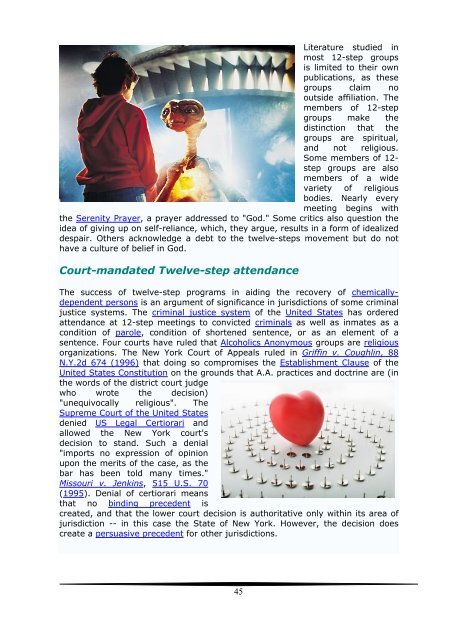personality disorders explained
Antisocial Personality Disorder, Codependence, Narcissism and Borderline
Antisocial Personality Disorder, Codependence, Narcissism and Borderline
You also want an ePaper? Increase the reach of your titles
YUMPU automatically turns print PDFs into web optimized ePapers that Google loves.
Literature studied in<br />
most 12-step groups<br />
is limited to their own<br />
publications, as these<br />
groups claim no<br />
outside affiliation. The<br />
members of 12-step<br />
groups make the<br />
distinction that the<br />
groups are spiritual,<br />
and not religious.<br />
Some members of 12-<br />
step groups are also<br />
members of a wide<br />
variety of religious<br />
bodies. Nearly every<br />
meeting begins with<br />
the Serenity Prayer, a prayer addressed to "God." Some critics also question the<br />
idea of giving up on self-reliance, which, they argue, results in a form of idealized<br />
despair. Others acknowledge a debt to the twelve-steps movement but do not<br />
have a culture of belief in God.<br />
Court-mandated Twelve-step attendance<br />
The success of twelve-step programs in aiding the recovery of chemicallydependent<br />
persons is an argument of significance in jurisdictions of some criminal<br />
justice systems. The criminal justice system of the United States has ordered<br />
attendance at 12-step meetings to convicted criminals as well as inmates as a<br />
condition of parole, condition of shortened sentence, or as an element of a<br />
sentence. Four courts have ruled that Alcoholics Anonymous groups are religious<br />
organizations. The New York Court of Appeals ruled in Griffin v. Coughlin, 88<br />
N.Y.2d 674 (1996) that doing so compromises the Establishment Clause of the<br />
United States Constitution on the grounds that A.A. practices and doctrine are (in<br />
the words of the district court judge<br />
who wrote the decision)<br />
"unequivocally religious". The<br />
Supreme Court of the United States<br />
denied US Legal Certiorari and<br />
allowed the New York court's<br />
decision to stand. Such a denial<br />
"imports no expression of opinion<br />
upon the merits of the case, as the<br />
bar has been told many times."<br />
Missouri v. Jenkins, 515 U.S. 70<br />
(1995). Denial of certiorari means<br />
that no binding precedent is<br />
created, and that the lower court decision is authoritative only within its area of<br />
jurisdiction -- in this case the State of New York. However, the decision does<br />
create a persuasive precedent for other jurisdictions.<br />
45

















